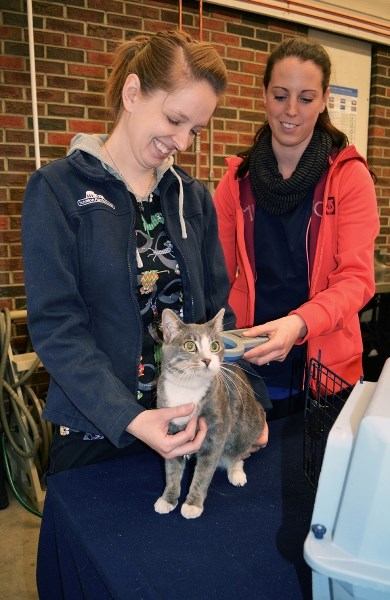Technology has been known to do amazing things, and today it's helping to keep beloved family pets safe.
Dozens of local pet owners lined up to have their dog or cat microchipped at a recent clinic on April 30 in Innisfail.
“This morning when we got here we had a bit of a lineup, which was very nice to see,” said Amy Corpe, animal care manager with the Red Deer and District SPCA. “We're glad that we're getting the community support to get some pets in here to get them microchipped.”
The town teamed up with the Red Deer & District SPCA to provide a low cost microchip clinic for the second consecutive year. Families who brought their pets to the clinic received the microchip for just $20 (an $80 value).
“They'll have a better chance at being reunited with their family in the event that they ever go missing,” she added, noting more than 50 family pets from Innisfail, Penhold, Bowden, Rocky Mountain House and Blackfalds were microchipped during the one-day clinic.
The microchip is the size of a grain of rice and once injected, it's neither felt nor seen by humans or by the animals.
“The microchip is implanted between the shoulder blades with a syringe. It's a very quick procedure. It takes less than five minutes in most cases to get it in and they don't feel it at all,” said Corpe. “It is a permanent identification (method) and it is imperative that owners keep their contact information up to date with the microchip company.”
The microchips used at the clinic on April 30 are universal chips made by Eidap Inc. and can be traced back to the owner from anywhere in the world.
Innisfail cat owner Kerri Mehl was one of many local residents who brought their family pet to the clinic. Boo the cat is the family's only pet and has a strong bond with her children, so she wanted to ensure Boo's safety in the future.
“She was a rescue kitty and we have concerns about losing her,” said Mehl. “My little girls are attached to her so we don't want to lose her. It's for security and safety too, that if she ever got lost we would be able to find her.”
Mehl liked the idea of using a universal microchip instead of tattoos – an identification process that has previously been used to identify lost animals in the province. She also liked the low cost.
“I think it's awesome. It saves us money and it's offered at a really good time with the economic downturn. I'm the only one working right now so it really helps us out,” Mehl added.
Corpe said the SPCA aims to provide the best care to animals and the best service to their human owners. Many times that includes ensuring their safety and well-being.
“Ultimately our goal and the Innisfail bylaw's goal is to always reunite animals with their families.”
Kerri Mehl
"It's for security and safety too, that if she ever got lost we would be able to find her."




